Pyunkang Korean Medicine Hospital dedicates to improvement of tonsils and lungs.
If there is Hippocrates in the West, there is Bian Que in the East. Bian Que (407-310 BC) became famous during the Warring States Period. However, his two brothers were also known as well as Bian Que. The king of the Yuan Dynasty once asked which of the three brothers was the most famous. Bian Que said he treats patients suffering from illness, but the older brother knows the serious illness that will soon come down on the patient and removes the cause before he gets sick. Though the patient did not even know that his older brother treated him, he was the most famous. The treatment of serious diseases is important, but it is an anecdote that emphasizes the importance of prevention of diseases and quick treatment.
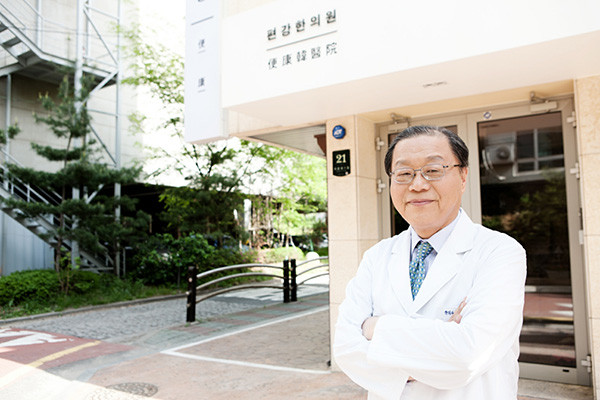
Dr. Seo Hyo-seok, clinical director of Pyunkang Korean Medicine Hospital, says it is prevention of diseases and strengthening of immunity that can beat the "era of viruses." Specifically, the key is to strengthen the tonsils, the first gate leading to the heart and lungs, and the front-line defender of our body.
The hospital changed its name to "Pyunkang" to highlight the importance of tonsils and lungs. It originally signified a sound body with a comfortable mind. Coincidentally, the name of Bian Que is the combination of “tonsils” and “magpie.” This signifies good news on the tonsils. For me, I will interpret it as “keep the tonsils healthy.”
Amid the continuing outbreak of the coronavirus, The Korea Post interviewed Seo Hyo-seok, clinical director of Pyunkang Korean Medicine Hospital, who has striven to improve the tonsils and lung health over the years.
Question: With the Corona19 virus outbreak these days, there's a huge interest in lung health.
Answer: It is “living” people who get sick. “Living” means you're breathing. In the course of breathing, all kinds of viruses get in. The respiratory tract is the primary path to invasion of germs. One of them is a military unit that protects the throat, and it is an immune system that filters out harmful substances from outside. Weakened tonsils can't resist external viruses and can cause many diseases. When the lungs are clean, the tonsils become stronger, and healthy white blood cells protect our body from external bacteria and keep in shape our immune system. In Chinese medicine, there is a term called the pulmonary cycle. It means the lung is the organ that controls the body's strength.
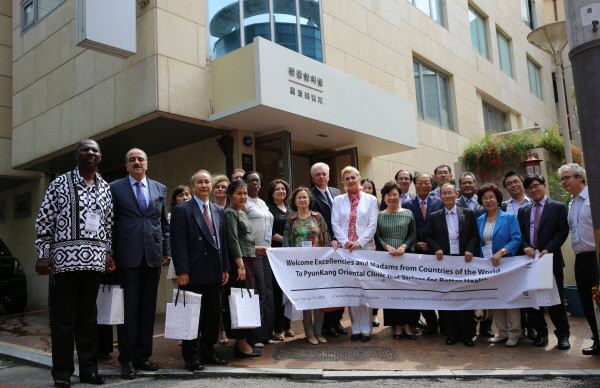
Q: One of the reasons I'm afraid of the coronavirus19 is that it can lead to lung damage, such as pulmonary fibrosis, even after a full recovery.
A: Because it is a new virus, I can’t say for sure, but it will damage your lungs to some extent. Lung damage can lead to severe lung diseases such as pulmonary fibrosis and COPD. Lung fibrosis is said to die in two to three years in modern medicine, but not necessarily. It can be cured. But I recommend prevention now. Any disease can be prevented in an easy and relatively short period of time, but treatment takes a long time and is difficult to cure. For example, if prevention takes about a year, complete recovery takes five to six years. It is the philosophy of Pyunkang Korean Medicine Hospital to eliminate the causes by focusing on the fundamental improvement of immunity. It is my belief that eventually “my body cures me.”
Q: In the end, you focus on the importance of immunity.
A: There have been repeated outbreaks of SARS, swine influenza, MERS and coronavirus 19. And even if we get through this now, we don't know what the virus is going to look like in five years. If the body's immune system and self-healing capacity are mitigated, there's no way to stop bacteria from attacking our body. There are two stages of body immunity. The first is that in a healthy way, the white blood cells with bright eyes prevent germs and viruses. The second is that the intestinal microbes fight and win against harmful bacteria.
Q: Regarding immunity, you might have paid more attention to intestines. Do you have any reason that you have focused on treatment of tonsils and lungs?
A: I have suffered several times a year since I was a child due to my weak tonsils. It was almost impossible to swallow a sip of water when the temperature jumped up to 40 degrees. At the time, the tolaryngology used to put reddish tincture with iodine, deep in the throat, and get a shot and come back. I was so embarrassed that I couldn't reveal that I was an Oriental doctor.
Q: I don't think it would have been easy to find a cure that worked no matter how desperate you were.
A: I was lucky somewhat. I considered tonsillitis as a fever flu, mixed all the medicinal ingredients which were introduced at Oriental medicinal books, steamed, mashed, roasted, and found a solution to cure tonsillitis in 1973. It has been used only on tonsillitis patients for quite a long time. Decades have passed without knowing that I had pearls in my hands.
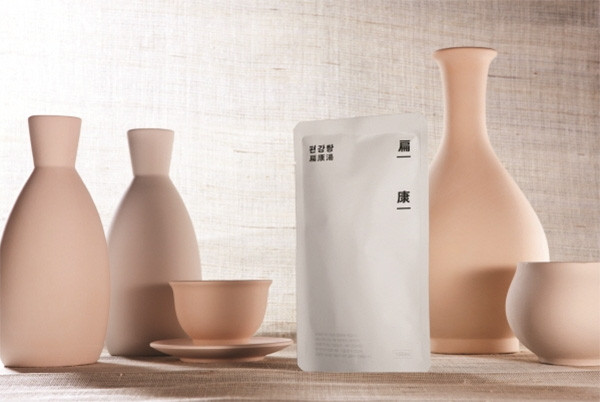
Q: How was the breakthrough Pyunkang–Tang developed?
A: During the 1997 financial crisis, we were at risk to close our oriental medicine clinic. In despair, I thought I should focus on one thing. My favorite prescription was four or five formulas including Gwibin-Tang. But we decided to specialize in Pyunkang-Tang. In 1998, we introduced an improved Pyunkang-Tang. We upgraded it once again in 2001. We found the best combination to clean up the lungs, including the gold-and-silver flower, lilyturf, lance asiabell, cocklebur, skullcap, and rehmannia glutinosa.
Q: Atopic dermatitis, rhinitis and asthma are typical chronic diseases that degrade the quality of life for modern people. The skin, nose, and neck are all different parts. What kind of device can I use to treat it?
A: There are no drugs to cure rhinitis, asthma or atopy. There is no way to just get rid of the fog, but as the sun rises, it is bound to disappear. Likewise, when your lungs get better, you get stronger, you get healthy lymphocytes, and you overcome rhinitis, asthma, and atopy. It is not a temporary relief, it is a body that can find the cause and overcome it. To be honest, I was surprised to get over my atopy. But when you look at atopic patients, they often don't sweat and clogged hair holes. In Chinese medicine, there is a saying that the lung controls the skin and hair. It is good for the lungs, so that the pores and fur holes open, and the waste hidden under the skin can escape.
Q: What's the most painful thing about seeing so many patients?
A: Western medicine works quickly. Patients would say, ‘’I am used to it” and often ask for immediate effect. But it takes time to save the broken lung cells and clean them up with medicinal herbs. If you clean up your lungs for about a year, your lung cells will come alive like a bud in an old tree.
Q: The term “medical food” is impressive.
A: Medical food is a term that contrasts with medical medicine. Synthetic drugs are usually divided into antibiotics, hepatitis, painkillers, and sedatives. Antibiotics are used to kill bad germs, and the problem is that good germs die with bad germs. If you take it for a long time, you can lose your immunity. One of the best anti-inflammatory drugs is steroids, which also has significant side effects. Painkillers and sedatives are also far from cure. It takes a lifetime to alleviate the symptoms, and over time, side effects and resistance continue to add drugs. But medical food makes a body that can overcome everything. These are all natural foods that strengthen your immune system. It is especially abundant in root vegetables.
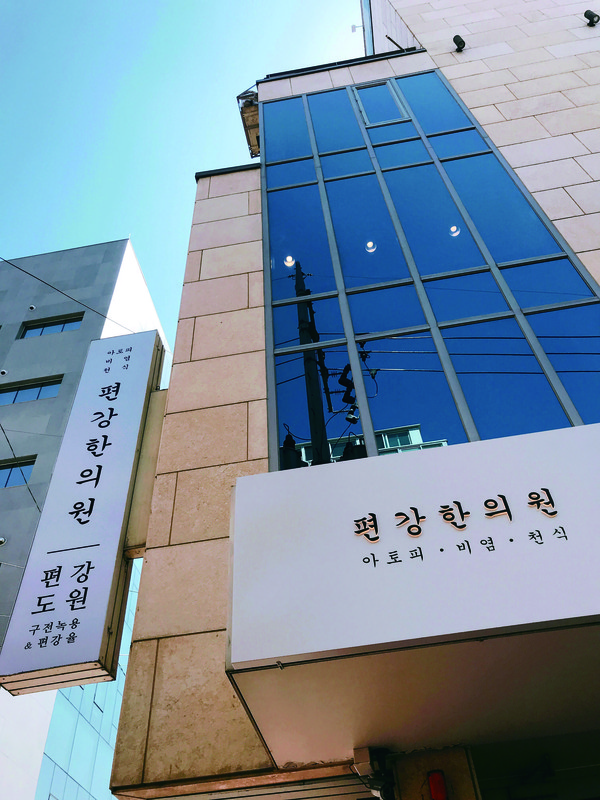
Q: Some people say that Oriental medicine is not scientific.
A: That is why I have made a lot of efforts to objectively prove the ingredients and efficacy of drugs. The thesis and research results were published in JTCM, a SCI-class international journal of international studies, saying, "Pyunkang-Tang & Pyunkang-Hwan extracts improve respiratory inflammatory bulimia and philomycin-induced pulmonary fibrosis caused by air pollutants." It was recognized as a non-toxic food product through an analysis by a microbag research institute which is registered with U.S. Food and Drug Administration (FDA).
Q: Do you have any memorable patients?
A: I remember my grandfather who was over eighty years old from North Hamgyeong Province now in North Korea... When he was six years old, her mother dragged him out to the snow. He overcame the high fever, but he had suffered from asthma for 74 years. My grandfather and grandmother have been in separate rooms for decades because of breathing difficulty since their marriage, and now I hear they are sleeping in the same room.
Q: It's amazing that you could enhance the old man's respiratory system which is supposed to degenerate. Please tell us about your vision for the age of 100.
A: I'd like to bring together several centenarians so that they can live together in good health. I actually think 100 years old people are going to do a great job just by living in one area. It will be an opportunity to promote Korea as a country which enjoys longevity.
Q: We are curious how the globalization of oriental medicine is going on.
A: Earlier, I participated in medical fairs in New York and advertised in The New York Times in an effort to inform Westerners of oriental medicine. It was not waste of money. I'm sure that one day, patients from all over the world will visit Korean Oriental medicine clinics. I still receive calls from all over the world from my office in Manhattan. How could the legendary doctor Hur Jun has dreamed of such a situation?
Our treatment is quite popular in China. In 2013, I appeared in a 52-episode medical program on NDT TV, the largest satellite broadcasting company in China. I think China needed me even more because so many people were suffering from respiratory problems because of yellow dust and smog. I have a lot of questions about Corona19 from China. Even very large companies in China have visited our clinic to distribute Pyunkang-Hwan to the Chinese people.
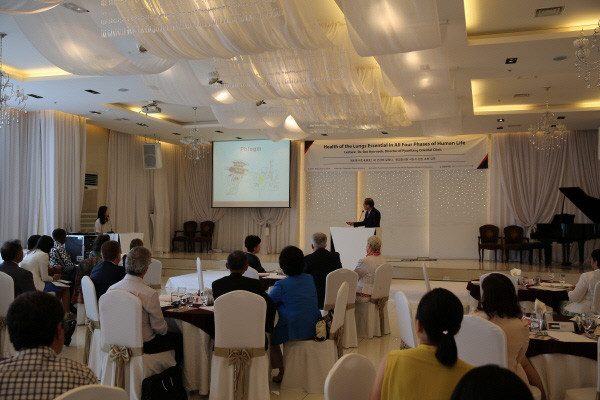
Q: As a director of the Korea Baduk Association, you are also very good at Go. We understand that Go helps you interact with those in China.
A: China and we are inseparable neighbors. Civilian exchanges are important, and Go is one of them along with Chinese medicine. Pyunkang Korean Medicine Hospital has hosted a Go competition in China, and is preparing for the global Korean-Chinese children’s Go competition in partnership with Pocheon City in June. For your information, Ke Jie, a Chinese professional Go player of 9-dan rank, has visited our Pyunkang Korean Medicine Hospital.
Q: Your Pyunkang Korean Medicine Hospital is more popular among young people thanks to its outstanding marketing. We understand that you started a YouTube program called “Seo Hyo-seok's Blue Lungs” recently.
A: Many people are having a hard time with various skin and lung diseases. I started to give them information via YouTube to keep up with the times. You can find it on YouTube if you search for “Pyunkang Korean Medicine Hospital.”
Q: Many people say it's not as easy to run Oriental medicine clinics these days as it was during the IMF crisis. Please say something as a senior doctor.
A: Oriental medicine doctors are having a hard time these days. The herbal medicine market has collapsed. We're filling up with existing products like Jeong Gwanjang (red ginseng), defying our expectations. But I am sure we will experience a medical food era if we wait a little longer. Natural water is a treasure with no side effects. I think Oriental doctors should work hard to develop herbal medicines that can help improve and cure immunity.
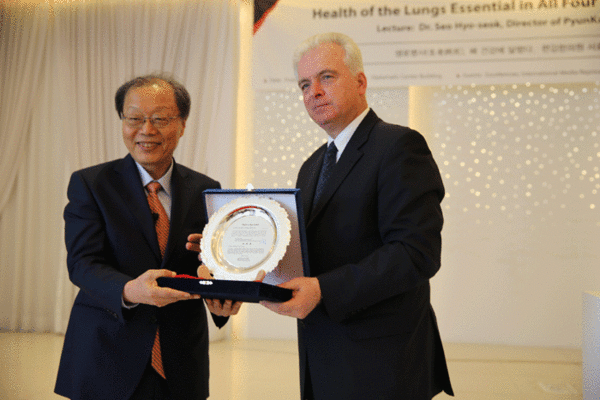
Q: We understand you have forged close relationships with the Seoul Diplomatic Corps (SDC)
A: I was awarded a Plaque of Appreciation from the SDC on July 18, 2014 as a token of expression of gratitude for our invitation of the members of the SDC to a lecture-luncheon event and a tour of his Clinic. Ambassador Dusan Bella of the Slovak Republic, who performed the role of dean of the visiting members of the SDC, presented the plaque.
I also made a lecture on Oriental medicine for foreign diplomats on Nov. 12, 2014 and this was followed by presentation of a Plaque of Appreciation to me by Ambassador Wijeratne of Sri Lanka on behalf of the ambassadors and other senior members of the Seoul Diplomatic Corps who attended the lecture.
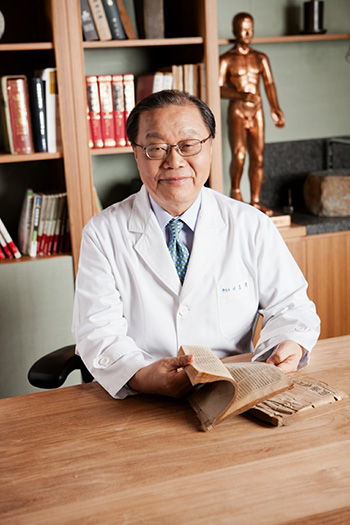
About Director Seo Hyo-seok
Clinical director of Pyunkang Korean Medicine Hospital Seocho head office.
Professor of Oriental medicine at Kyung Hee University
Vice President of Korea Global Healthcare Association
Director of the Korea AIDS Prevention Association
1972: Specialized in Oriental medicine in Kyung Hee University
1978: Full-time instructor at Wonkwang University Oriental Medicine Hospital
1991: Chairman of the Dongdaemun-gu (Seoul) branch of Association of Korean Medicine
1992: Served as chairman of the Association of Korean Medicine’s drug screening committee.

